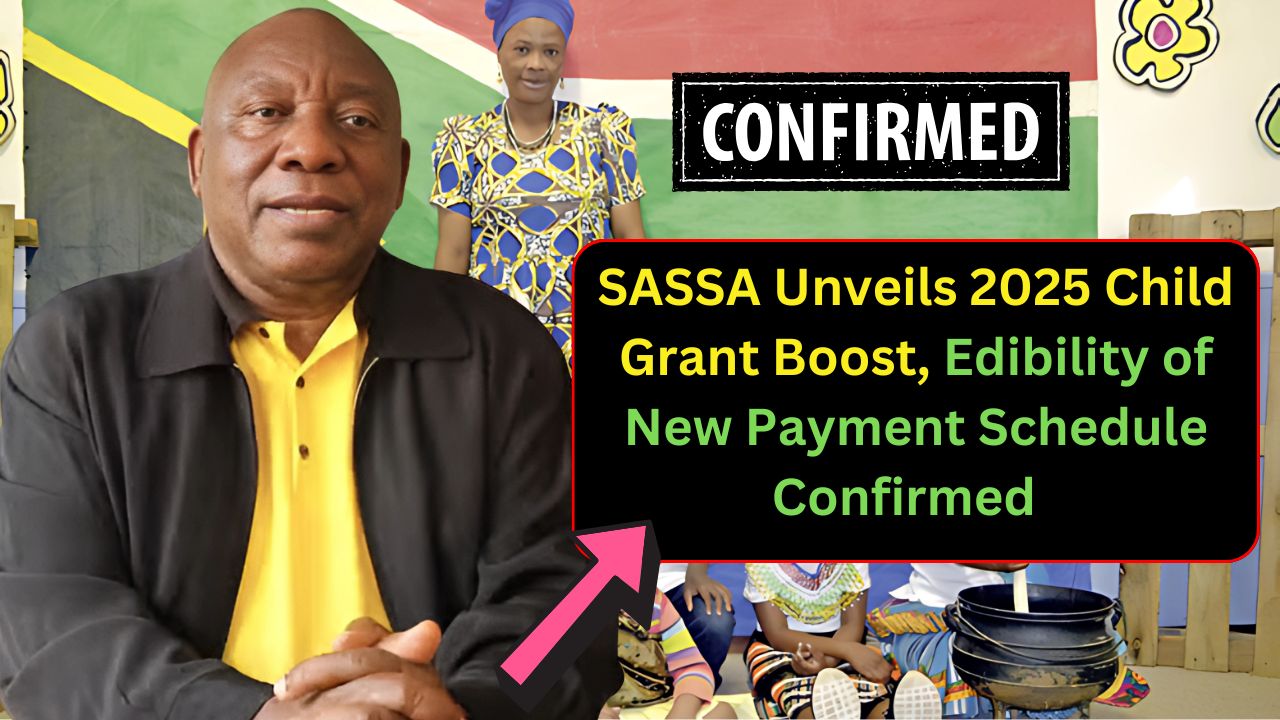SASSA Unveils 2025 Child Grant Boost: The South African Social Security Agency has made headlines with its comprehensive announcement regarding substantial improvements to child support grants throughout 2025.
Families across the nation are breathing a collective sigh of relief as these enhanced benefits promise to provide crucial financial assistance during increasingly challenging economic times.
Revolutionary Changes Transform Child Support Landscape
This year marks a pivotal moment for South African families struggling to make ends meet. The agency has implemented a carefully structured approach that not only increases grant amounts but also streamlines the entire payment process. These modifications reflect the government’s deep understanding of the real-world challenges facing caregivers who depend on these vital funds to provide for their children’s basic needs.
The transformation goes beyond simple monetary adjustments. Officials have redesigned the entire system with beneficiaries’ experiences at the forefront, recognizing that efficient access to funds can mean the difference between a child having nutritious meals or going without essential requirements.
Current Grant Amounts and Impact on Households
The child support grant now stands at R530 per month per child, representing a meaningful increase that acknowledges the rising cost of living. This amount might seem modest to some, but for families earning below the threshold requirements, it represents a lifeline that enables them to purchase school supplies, basic clothing, and nutritious food items.
Consider the practical impact on a single mother caring for two children. The monthly R1,060 she receives can cover approximately two weeks of groceries, school transportation costs, or essential medical expenses that might otherwise be impossible to manage. These grants don’t replace other income sources but serve as crucial support that bridges the gap between survival and stability.
Eligibility Requirements Made Simple
Understanding who qualifies for these benefits remains paramount for potential applicants. The requirements have been maintained to ensure assistance reaches those who need it most while preventing misuse of resources.
Single caregivers must earn less than R61,200 annually, which translates to approximately R5,100 per month. For married couples, the combined household income threshold sits at R122,400 yearly, or R10,200 monthly. These figures reflect realistic income levels for working-class families who genuinely require governmental support.
The caregiver doesn’t necessarily need to be the biological parent. Grandparents, relatives, or other individuals who serve as primary caregivers can apply, provided they can demonstrate their responsibility for the child’s daily care and wellbeing.
Strategic Payment Schedule Optimization
The 2025 payment calendar has been meticulously planned to avoid conflicts with public holidays and ensure consistent monthly distribution. Payments typically occur during the first week of each month, with specific dates including June 5th for children’s grants, creating predictability that helps families budget effectively.
This scheduling approach recognizes that grant recipients often need to plan their monthly expenses around payment dates. Many families use these funds immediately for essential purchases, making timing crucial for their financial stability.
Multiple Access Methods Enhance Convenience
SASSA has expanded payment options to accommodate different preferences and circumstances. Beneficiaries can receive funds through direct bank transfers, SASSA cards at ATMs, designated pay points including post offices, or money transfer services like Mukuru.
This flexibility proves especially valuable for rural communities where banking infrastructure might be limited. A grandmother caring for her grandchildren in a remote village can collect funds at the local post office, while a working parent in an urban area might prefer direct bank deposits for convenience.
Application Process Demystified
Applying for child support grants doesn’t require complex procedures or extensive documentation. The process begins at any SASSA office or regional service point, where trained officials assist with form completion at no charge.
Essential documents include the caregiver’s barcoded South African identity document and the child’s birth certificate containing an ID number. If the caregiver isn’t the biological parent, additional proof of primary care responsibility is required.
Processing Timeline and Expectations
Applications typically require up to three months for processing, but approved payments are backdated to the application date. This ensures families don’t lose benefits due to administrative delays beyond their control.
The system acknowledges that desperate families can’t wait indefinitely for assistance. By backdating payments, SASSA ensures that caregivers receive the full benefit they’re entitled to, even when processing takes longer than expected.
Additional Support Programs Available
Beyond standard child support grants, SASSA offers specialized assistance for children with particular needs. The Care Dependency Grant provides R2,190 monthly for children with severe disabilities, as certified by government medical officers.
Foster Child Grants offer R1,190 monthly to court-appointed foster parents operating under the South African Child Care Act. These programs recognize that some children require additional resources due to circumstances beyond their control.
Card Replacement and Security Measures
All SASSA Gold Cards expired on March 20, 2025, requiring beneficiaries to obtain new Postbank Black Cards. This transition enhances security features and reduces fraud risk while maintaining easy access to funds.
Cardholders must present valid identification when requesting replacements. The agency emphasizes that no cards will be issued without proper documentation, protecting both beneficiaries and the integrity of the grant system.
Long-term Financial Planning Benefits
Families who register newborns immediately and maintain grants until age 18 could receive approximately R135,480 over the child’s lifetime, assuming annual 5% increases. This substantial support can significantly impact a child’s development trajectory and future opportunities.
Early registration ensures maximum benefit utilization while providing consistent support throughout crucial developmental years. The cumulative impact extends far beyond monthly payments, potentially influencing educational outcomes and overall life prospects.
Addressing Common Misconceptions
SASSA regularly combats misinformation circulating on social media platforms. Recent false claims about double payments in June 2025 caused unnecessary confusion among beneficiaries. The agency emphasizes that only official announcements from credible sources should be trusted.
These clarifications protect beneficiaries from disappointment and help maintain realistic expectations about available support. Clear communication prevents panic and ensures families can plan appropriately based on accurate information.
Future Outlook and Sustainability
The government has allocated R422.3 billion for social development in 2025/26, increasing to R452.7 billion by 2027/28. This represents an average annual growth rate of 4.5%, demonstrating continued commitment to social welfare programs.
Officials recognize that maintaining these programs requires careful balance between supporting vulnerable families and ensuring fiscal sustainability. The comprehensive approach considers both immediate needs and long-term economic stability.
Social grant spending constitutes 81% of the social development allocation, highlighting these programs’ central importance in South Africa’s poverty reduction strategy. The investment reflects understanding that supporting children today builds stronger communities tomorrow.
Frequently Asked Questions
Can I apply for multiple children at once? Yes, you can apply for child support grants for multiple children simultaneously. However, you cannot receive grants for more than six children who are not your biological or legally adopted children.
What happens if my income changes after approval? You must report significant income changes to SASSA immediately. Your grant will be reviewed periodically, and changes in your financial situation may affect your eligibility or grant amount.
How do I appeal if my application is rejected? If your application is refused, you have the right to appeal the decision. Contact your local SASSA office for appeal procedures and ensure you understand the specific reasons for rejection to address them effectively.

